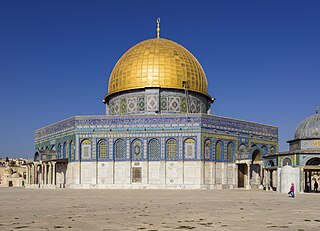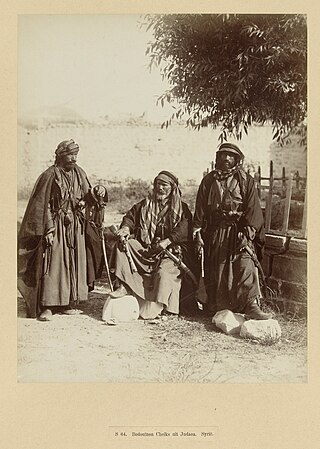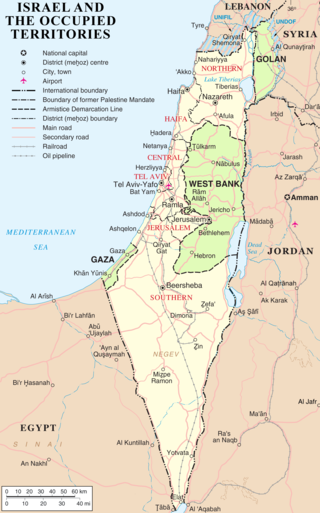Leaders of Arab League member states
Note: (*) means leadership is disputed.
This is a list of leaders of Middle Eastern and North African states. It consists of the heads of state and government within the Arab League, and of other MENA countries outside it.
Note: (*) means leadership is disputed.

The Middle East is a geopolitical region encompassing the Arabian Peninsula, the Levant, Turkey, Egypt, Iran, and Iraq. The term came into widespread usage as a replacement of the term Near East beginning in the early 20th century. The term "Middle East" has led to some confusion over its changing definitions, and being seen as too Eurocentric. The region includes the vast majority of the territories included in the closely associated definition of West Asia, but without the South Caucasus, and additionally includes all of Egypt and all of Turkey.

The history of the State of Palestine describes the creation and evolution of the State of Palestine in the West Bank and Gaza Strip. During the Mandatory period, numerous plans of partition of Palestine were proposed but without the agreement of all parties. In 1947, the United Nations Partition Plan for Palestine was voted for. The leaders of the Jewish Agency for Palestine accepted parts of the plan, while Arab leaders refused it. This triggered the 1947–1949 Palestine war and led, in 1948, to the establishment of the state of Israel on a part of Mandate Palestine as the Mandate came to an end.

The Bedouin, Beduin, or Bedu are pastorally nomadic Arab tribes who have historically inhabited the desert regions in the Arabian Peninsula, North Africa, the Levant, and Mesopotamia (Iraq). The Bedouin originated in the Syrian Desert and Arabian Desert but spread across the rest of the Arab world in West Asia and North Africa after the spread of Islam. The English word bedouin comes from the Arabic badawī, which means "desert-dweller", and is traditionally contrasted with ḥāḍir, the term for sedentary people. Bedouin territory stretches from the vast deserts of North Africa to the rocky ones of the Middle East. They are sometimes traditionally divided into tribes, or clans, and historically share a common culture of herding camels, sheep and goats. The vast majority of Bedouins adhere to Islam, although there are some fewer numbers of Christian Bedouins present in the Fertile Crescent.

The Palestinian territories are the two regions of the former British Mandate for Palestine that have been occupied by Israel since the Six-Day War of 1967, namely the West Bank and the Gaza Strip. The International Court of Justice (ICJ) has referred to the West Bank, including East Jerusalem, as "the Occupied Palestinian Territory", and this term was used as the legal definition by the ICJ in its advisory opinion of July 2004. The term occupied Palestinian territory was used by the United Nations and other international organizations between October 1999 and December 2012 to refer to areas controlled by the Palestinian National Authority, but from 2012, when Palestine was admitted as one of its non-member observer states, the United Nations started using exclusively the name State of Palestine. The European Union (EU) also uses the term "occupied Palestinian territory". The government of Israel and its supporters use the label "disputed territories" instead.

The Arab world, formally the Arab homeland, also known as the Arab nation, the Arabsphere, or the Arab states, comprises a large group of countries, mainly located in Western Asia and Northern Africa. While the majority of people in the Arab world are ethnically Arab, there are also significant populations of other ethnic groups such as Berbers, Kurds, Somalis and Nubians, among other groups. Arabic is used as the lingua franca throughout the Arab world.

The Camp David Accords were a pair of political agreements signed by Egyptian President Anwar Sadat and Israeli Prime Minister Menachem Begin on 17 September 1978, following twelve days of secret negotiations at Camp David, the country retreat of the President of the United States in Maryland. The two framework agreements were signed at the White House and were witnessed by President Jimmy Carter. The second of these frameworks led directly to the 1979 Egypt–Israel peace treaty. Due to the agreement, Sadat and Begin received the shared 1978 Nobel Peace Prize. The first framework, which dealt with the Palestinian territories, was written without participation of the Palestinians and was condemned by the United Nations.

The Egypt–Israel peace treaty was signed in Washington, D.C., United States, on 26 March 1979, following the 1978 Camp David Accords. The Egypt–Israel treaty was signed by Anwar Sadat, President of Egypt, and Menachem Begin, Prime Minister of Israel, and witnessed by Jimmy Carter, President of the United States.

The Southern Levant is a geographical region encompassing the southern half of the Levant. It corresponds approximately to modern-day Israel, Palestine, and Jordan; some definitions also include southern Lebanon, southern Syria and/or the Sinai Peninsula. As a strictly geographical description, it is sometimes used by archaeologists and historians to avoid the religious and political connotations of other names for the area.

The 1949 Armistice Agreements, which ended the 1948 Arab–Israeli War by delineating the Green Line as the legal boundary between Israel and the Arab countries, left the Kingdom of Egypt in control of a small swath of territory that it had captured and occupied in the former British Mandate for Palestine: the Gaza Strip. This period saw the creation of the All-Palestine Government within the All-Palestine Protectorate, an Egyptian client state that lasted until 1959, a year after the Republic of Egypt and the Second Syrian Republic merged to form a single sovereign state known as the United Arab Republic. The Egyptian occupation of the Gaza Strip was briefly subsumed by Israel during the 1956 Suez Crisis and ended entirely during the 1967 Arab–Israeli War, after which the Israeli Military Governorate was established in the territory and succeeded by the Israeli Civil Administration in 1981; the direct Israeli presence in the Gaza Strip ended with the 2005 disengagement plan.

The state of Democracy in Middle East and North Africa can be comparatively assessed according to various definitions of democracy. According to The Economist Group's Democracy Index 2023 study, Israel is the only democratic country in the region, qualified as a "flawed democracy". According to the V-Dem Democracy indices, the Middle Eastern and North African countries with the highest scores in 2024 are Israel, Tunisia and Iraq.

The Middle East and North Africa (MENA), also referred to as West Asia and North Africa (WANA) or South West Asia and North Africa (SWANA), is a geographic region. While still referring to most of the Middle East and North Africa together, it is widely considered to be a more defined and apolitical alternative to the grouping of countries that is known as the Greater Middle East, which comprises the bulk of the Muslim world.

The Allon Plan was a political proposition that outlined potential next steps for Israel after the 1967 Arab–Israeli War. It was drafted by Israeli politician Yigal Allon following Israel's seizure of territory from Syria, Jordan, and Egypt; the Israeli military had come to occupy Syria's Golan Heights, the Jordanian-annexed West Bank and the Egyptian-occupied Gaza Strip, and Egypt's Sinai Peninsula. Allon advocated a partitioning of the West Bank between Israel and Jordan, the creation of a sovereign state for Druze in the Golan Heights, and the return of most of the Sinai Peninsula to Egypt.

The politics of the Sahrawi Arab Democratic Republic refers to politics of the Polisario Front's proclaimed Sahrawi Arab Democratic Republic, a country in North Africa with limited recognition by other states, controlling parts of the Western Sahara region.

The partition of the Ottoman Empire was a geopolitical event that occurred after World War I and the occupation of Constantinople by British, French, and Italian troops in November 1918. The partitioning was planned in several agreements made by the Allied Powers early in the course of World War I, notably the Sykes–Picot Agreement, after the Ottoman Empire had joined Germany to form the Ottoman–German Alliance. The huge conglomeration of territories and peoples that formerly comprised the Ottoman Empire was divided into several new states. The Ottoman Empire had been the leading Islamic state in geopolitical, cultural and ideological terms. The partitioning of the Ottoman Empire after the war led to the domination of the Middle East by Western powers such as Britain and France, and saw the creation of the modern Arab world and the Republic of Turkey. Resistance to the influence of these powers came from the Turkish National Movement but did not become widespread in the other post-Ottoman states until the period of rapid decolonization after World War II.

The modern borders of Israel exist as the result both of past wars and of diplomatic agreements between the State of Israel and its neighbours, as well as an effect of the agreements among colonial powers ruling in the region before Israel's creation. Only two of Israel's five total potential land borders are internationally recognized and uncontested, while the other three remain disputed; the majority of its border disputes are rooted in territorial changes that came about as a result of the 1967 Arab–Israeli War, which saw Israel occupy large swathes of territory from its rivals. Israel's two formally recognized and confirmed borders exist with Egypt and Jordan since the 1979 Egypt–Israel peace treaty and the 1994 Israel–Jordan peace treaty, while its borders with Syria, Lebanon and the Palestinian territories remain internationally defined as contested.

The military history of Azerbaijan is framed within thousands of years of armed actions of many other states in the territory encompassing modern Azerbaijan, as well as the shorter history of interventions by the Azerbaijani Armed Forces in conflicts abroad. The Azerbaijanis are the inheritors of the lands of various ancient civilizations and peoples including the indigenous Caucasian Albanians, Iranian tribes such as Scythians and Alans, and Oghuz Turks among others.
beIN Sports is a Qatari multinational network of sports channels owned and operated by the Qatari media group beIN. The network has played a major role in the increased commercialization of Qatari sports. Its chairman is Nasser Al-Khelaifi, and its CEO is Yousef Obaidly.

The All-Palestine Government was established on 22 September 1948, during the 1948 Arab–Israeli War, to govern the Egyptian-controlled territory in Gaza, which Egypt had on the same day declared as the All-Palestine Protectorate. It was confirmed by the Arab League and recognised by six of the then seven Arab League members, with Transjordan being the exception. Though it claimed jurisdiction over the whole of the former Mandatory Palestine, its effective jurisdiction was limited to the All-Palestine Protectorate, which came to be called the Gaza Strip. The President of the protectorate was Hajj Amin al-Husseini, former chairman of the Arab Higher Committee, and the Prime Minister was Ahmed Hilmi Pasha. The legislative body was the All-Palestine National Council.
Shahid is an Arabic content streaming platform operated by the Saudi state-owned MBC Group.